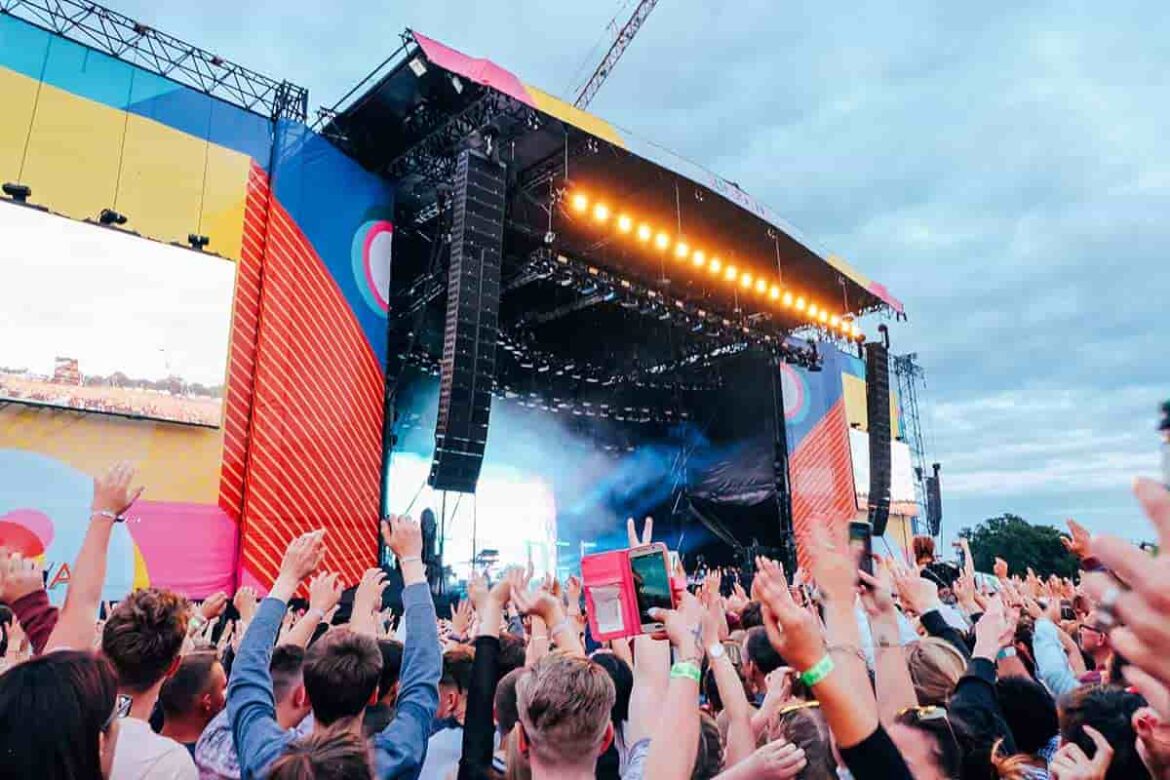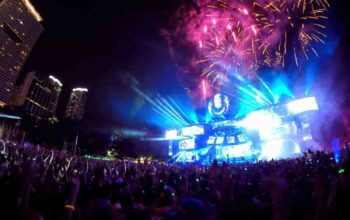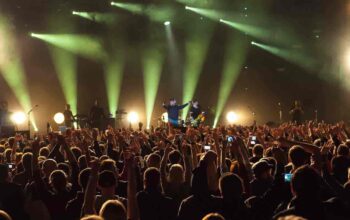How Did Music Festivals Start: A Not-Boring History
Music festivals are one of the best events to go to! You can hear new and old artists alike bring out their best on stage and perform current and past chart-topping songs. They also bring people all over the world together. But how did music festivals start, where did they come from?
Music festivals have been happening since Ancient Greece, when festivals and celebrations combined music, art, and sports. The modern music festival began in the 19th century—when the Bayreuth Festival was created to showcase classical music artists—and has since developed for various genres.
This article will explain what a music festival is, pinpoint the earliest recorded music festival and how these events started, and cover where music festivals are hosted today.
What Exactly is a Music Festival?
Many people have been to a music festival, but can they describe what it is to a friend, family member, or tourist? Here’s how it’s pretty self-explanatory.
A music festival is a huge indoor or outdoor gathering, where a lineup of musicians performs their songs back to back. Depending on the size and the number of people attending, the festival can last for one day or continue over several. There are multiple stages so that more than one artist can perform at once. Music festivals can be used to raise money for a charity or be for-profit.
Each music festival that occurs either has a theme or showcases a specific genre of music. The artists play old and new songs to appease their long-time fans and attract new ones. Attendees may dress in costume depending on the aesthetic of the event and can often be seen dancing or singing along with the performer on stage.
The location and details the festival team put into the event determine the amenities offered (camping area, shower, bathrooms, fair games, food stalls, seats at stages) and the featured vendors. Music festivals are essentially multi-day concerts, and they usually occur in the summertime when most of the crowd makes a vacation out of attending.
What’s the Earliest Recorded Music Festival?
Music festivals have been popular for many years, but what was the first official one?
The Pythian Games, held in the 6th century BC in Ancient Greece, are considered by many to be the world’s first music festivals because they were held to honor Apollo, the god of music. They took place at Delphi, Apollo’s sanctuary in the center of Greece.
The Pythian Games were a predecessor of the Olympics, held every four years, and were filled with dance, art, and music. Music competitions called musikos agon, as well as sports and strength competitions, drew thousands of people to the event, and by the 10th century, BC Greece was still the most popular place to go for musical events.
People who won the competitions would be crowned with a bay laurel wreath that was a symbol of Apollo. The honor that Grecians brought to themselves, their families, and the patron gods of this and other festivals meant more than any prize money they would have received. They loved their culture and country the most!
How Did Music Festivals Start?
The Pythian Games to honor Apollo—and later the Festival of the Flower to honor Dionysus in Ancient Greece—were the humble beginnings of the music festival. However, by the Middle Ages, music festivals and fairs grew popular across Europe. Like the Greek festivals, these featured contests, games, and several musical performances of folk songs and region-specific music.
Modern music festivals took inspiration from this event and added their own spin to create something different from the past. Let’s look at how modern music festivals developed into what we think of today when someone brings up these events.
Music Festivals from the 19th Century Onward
The Bayreuth Festival, held in 19th century Bavaria, was one of the first annual festivals dedicated solely to music and is considered the first modern music festival. It was started as a promotional event for the classical artist Richard Wagner, which aptly skyrocketed his career. King Ludwig II and other members of royalty attended to listen to him play. The Bayreuth Festival continues to the present day and is the biggest celebration of Wagner’s music.
In the 20th century, jazz was the main music genre at music festivals and gatherings, which helped promote this type of music. However, most of these festivals did not have the financial standing to last more than a year or draw a large enough crowd.
The Newport Jazz Festival, first held in 1954, was the largest music festival to focus on a single genre. The 1958 film, Jazz on a Summer’s Day, encouraged crowds to attend the festival and drove up the demand for music festivals throughout the year. This demand spawned the Newport Folk Festival in 1959, and the Reading Festival in Reading, London.
As rock music grew in popularity in the 1960s, rock bands and artists would use jazz festival gigs to share their music with the world. Led Zeppelin, one of today’s most popular classic rock bands, took advantage of these opportunities to become a top-performing group.
Modern Music Festivals
With the advent of the late 1960s, rock bands and their teams started to create their own music festivals, and the first well-known rock music festival was the Monterey Pop Festival, which made its debut on the scene in 1967. (The Who played here, and they gained popularity in America as well as Great Britain!)
The next festival to emerge was the Isle of Wright Festival in 1968, featuring Jefferson Airplane, Pretty Things, Arthur Brown, and more, along with 10,000 crowd members. Two years later, more than 600,000 people were in attendance, which prompted other festival organizers to copy the Isle of the Wright Festival.
One of these copies was the Summerfest festival, created in 1968. This event made cities across the US see that music festivals and other large events would bring in a lot of revenue that they could put back into the community. The music festival that made the popularity of such events soar and become solidified in the minds of Americans was Woodstock in 1969.
The first Woodstock festival almost did not happen because the governor of New York at the time threatened to use the National Guard to keep the festival from starting. This was because many of the locals thought it was inappropriate. The next year, a documentary about it was released, which encouraged Americans to attend. Open-air concerts also began to rise in popularity.
Music Festivals Today
Throughout the 2010s and the beginning of the 2020s before the pandemic, music festivals had to keep up with the times and changes in the industry, such as the overwhelming popularity of music streaming. Streaming has allowed new genres and artists that would not typically be noticed to surface.
Additionally, you’ll find that male-dominated rock or alternative bands are now often at the top of festival setlists, which is a transition from the traditional music of the past. However, the industry is working toward making music festivals more gender-balanced; for example, in 2019, alternative music sensation, Billie Eilish, headlined the Reading Music Festival.
Virtual Music Festivals
The COVID-19 pandemic had rocked the entertainment industry, including the music festival scene. With that in mind, the state of music festivals in 2021—one year after the pandemic’s start—and beyond has evolved even more.
In fact, one development music lovers are now finding is the proliferation of virtual music events. After purchasing a ticket, you can simply go online and log in with your phone or laptop and enjoy live music that way. Of course, this isn’t exactly the same experience as hearing the music in person, but many find this a great alternative if they’re unable to travel to events taking place outside of their state or country.
There are even some festivals that have created more intimate events by spreading out festivals across multiple days or weekends, resulting in smaller crowds to improve your overall experience while attending.
Which Countries Host the Most Music Festivals Today?
It is clear that music festivals had a long journey to become the widely popular events they are today, but which nations currently host the majority of them?
Music festivals are now regularly held throughout Europe, Asia, Australia, and the Americas, proving that music is truly a universal language that all can enjoy. However, the UK and US hold the most music festivals out of all the nations.
But although these countries host the most music festivals, that doesn’t necessarily mean that they’re the biggest; in an article about the biggest music festivals worldwide, these two countries hosted only 15 out of the 41 biggest festivals mentioned on the list.
Where is the Most Popular Music Festival?
The biggest and most frequented music festival of the current era is Donauinselfest (Danube Island Festival), in Vienna, Austria. It is also the largest free-of-charge open-air musical event on the European continent, known to have hosted 2.7 million people! There are over 600 hours of entertainment spread across ten stages from artists in all musical genres, all within one weekend. It has been taking place since 1984.
The festival is held on a man-made island that is also a recreation area where people visiting can hike, swim, bike, trampoline, rock climb, drink, eat, and otherwise enjoy themselves. The area is transformed for the festival and has 17 activity zones.
The addition of so many extra activities and music is a direct result of the fact that the entertainment industry recognized the profitability of these festivals earlier in history. The money can be used to pay the artists who play there or help the host city grow.
The only thing you may have to pay for is the extra activities and food. Although the festival features most artists from Austria and Germany, they have featured international musicians like Taio Cruz before.
Final Thoughts
Music festivals are huge multi-day concerts designed to celebrate one genre or music in general. The first one was held in Ancient Greece, which eventually led to modern festivals like Woodstock and Coachella. The US and UK host the most music festivals today, but they are popular events for music lovers worldwide.
So, you can see that music and music festivals bring everyone together, and they have helped many people relax and unwind from the stress of life and offer support when they need it. They have come so far since the Pythian Games, so they will likely become more innovative as time goes on.




